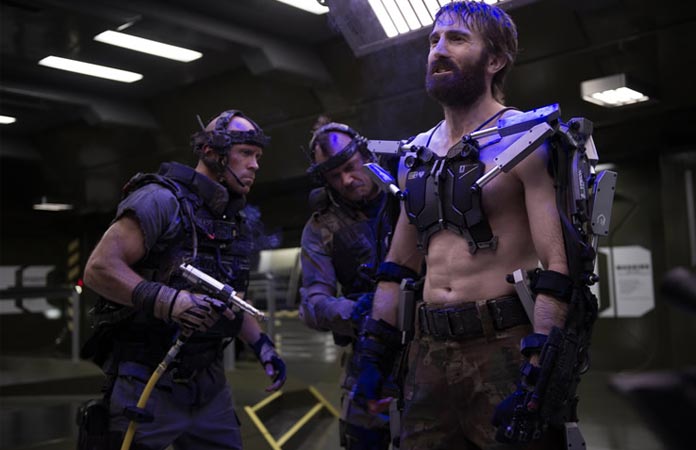From M. Night To Elysium (And Maybe Back Again)
Published on August 22nd, 2013 in: Movies |By LabSplice

Everyone needs help. Even Sharlto Copley in a mecha-suit.
At the turn of the century, Stephen Spielberg and George Lucas were working on a long-awaited sequel to the Indiana Jones trilogy and in search of a writer. One of the names on their list was M. Night Shyamalan, the celebrated writer-director of The Sixth Sense and an emerging talent who was already receiving praise as the next Spielberg in Hollywood. Fans were excited at the chance to see Shyamalan bring his vision to the Indiana Jones universe; unfortunately, due to conflicts with his production schedule, Shyamalan was forced to turn down the opportunity, and the script was passed along. Since then, Shyamalan has worked solely on his own projects, working double duty on all of his films as both writer and director.
A few months ago, news broke that Elysium director Neill Blomkamp had turned down the opportunity to direct a new Star Wars film. Fans of the franchise were understandably upset; the original Star Wars films depict a universe full of secondhand spaceships and repurposed technology, an obvious influence on Blomkamp’s production design in both District 9 and Elysium. Blomkamp, recently named as one of the 100 most influential people in the world by Time magazine, was an emerging talent and a good aesthetic fit for the Star Wars universe. Still, Blomkamp turned the opportunity down, citing his desire to direct his own material as his motivating factor, and people were quick to praise the director for developing original science fiction stories.
It seems like the perfect anecdote for a summer dominated by comic book adaptations and sequels: talented director reaches the heights of fame and is offered a chance to participate in a blockbuster movie franchise, only to turn it down in favor of original material. Unfortunately, we all know the path Shyamalan would take with his original creations. His films, so promising to begin with, have been let down by the absurd liberties he takes as a writer—and Blomkamp appears poised to make these same mistakes all over again.
There are many parallels to be drawn between the two directors. Both represent the outsider in Hollywood both by birth and by location—Shyamalan was originally born in India and raised in Philadelphia, Blomkamp in South Africa and Vancouver. Both filmmakers also emerged on the scene with an unlikely hit; while Shyamalan and Blomkamp had worked on various projects prior to The Sixth Sense and District 9, those two films received Academy Award nominations and represented a surprisingly amount of commercial and critical success for the two unknowns.
Yet perhaps the biggest comparison between the two is that their skills as directors far outweigh their talent as writers. Both Shyamalan and Blomkamp create characters whose sole purpose is to advance the plot. Their scripts may aim to convey noble concepts—Shyamalan the nature of faith and heroism, Blomkamp the idea of equality in race and power—but they lack the subtlety needed to let these themes organically develop from the characters. Too often Shyamalan and Blomkamp ask us to put our faith in exaggerations, characters whose actions strain credulity but are necessary to keep the momentum going. When Bruce Willis’s son pulls a gun on him in Unbreakable; when the mercenaries try to take over the government in Elysium; these are actions necessary for the broader point that Shyamalan and Blomkamp are trying to make but seem strung together. Elysium and most of Shyamalan’s films play like treatments, a glorified “Story By” credit that should have been fleshed out by someone else.
So how to buck the trend? How does Shyamalan repair his reputation and Blomkamp avoid the risk of repeating the former’s mistakes? Direct a non-original screenplay. George Lucas, the man whose stories both Shyamalan and Blomkamp turned down, was never better than when he left the writing to someone else. While many people have turned criticism of Shyamalan’s films into its own brand of performance art, his skill as a director is often overlooked. Shyamalan has always had an eye for depth in his photography, placing a static image on the screen and then drawing our eye to what is not in focus (consider the hospital scene in Unbreakable or the pre-crash sequence between father and son in After Earth). And Blomkamp has an endless sea of intelligent science fiction—short stories, books, unpublished screenplays—to work with to his advantage. Take the time to direct a Philip K. Dick adaptation and see where it leads you.
It may be too early to write off Blomkamp as an auteur, and it may be too late to salvage the reputation of Shyamalan in Hollywood. However, both filmmakers are doing themselves a disservice by refusing the opportunity to try something new to them. It does not have to be a Star Wars or an Indiana Jones to make their mark, but the truth is that not everyone was meant to be Stanley Kubrick. I am not against original stories in filmmaking—nd I certainly want a filmmaker to have every opportunity to realize his or her vision uncompromised on the screen—but it pains me to watch films with great actors and keen direction be done in by limited stories. Both Shyamalan and Blomkamp are capable of so much more than what they’ve given us. Sometimes all it takes is someone to tell them no.
Time limit is exhausted. Please reload the CAPTCHA.